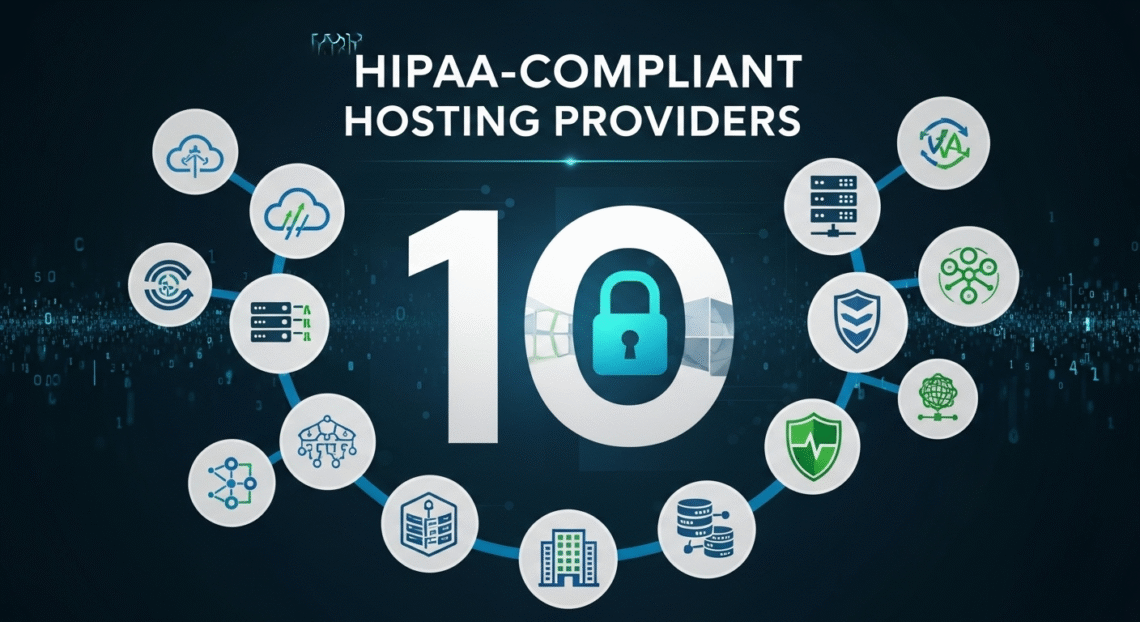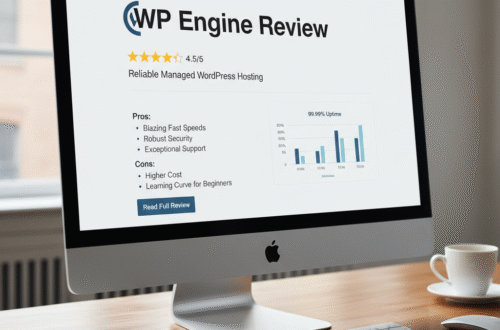For any organization handling protected health information (PHI), from healthcare providers to MedTech startups, choosing a hosting provider isn’t just a technical decision—it’s a legal and ethical mandate. The Health Insurance Portability and Accountability Act (HIPAA) sets strict standards for data protection, and failure to comply can lead to devastating fines and a complete loss of patient trust.
But the world of “HIPAA-compliant hosting” is complex. Many providers claim compliance, but the responsibility ultimately falls on you, the covered entity, to ensure every safeguard is in place. This guide cuts through the noise to rank and review the top 10 HIPAA-compliant hosting providers for 2025, offering a clear, authoritative, and experience-driven analysis to help you make the right choice.
How We Ranked These Providers
To create this list, we evaluated providers based on criteria that matter most for security, compliance, and usability:
-
Business Associate Agreement (BAA): Only providers that sign a BAA were considered. This is a non-negotiable legal contract required under HIPAA.
-
Technical Safeguards: We assessed the strength of their security infrastructure, including end-to-end encryption, firewalls, intrusion detection systems, and secure data centers.
-
Compliance & Audit Readiness: We favored providers with documented compliance controls, HITRUST certification, and features that simplify audit processes.
-
Scalability & Performance: The ability to grow and handle mission-critical healthcare workloads without sacrificing speed or security.
-
Support & Expertise: Access to 24/7 support from engineers who understand the unique demands of healthcare compliance.
The Top 10 HIPAA-Compliant Hosting Providers of 2025
| Provider | Best For | Key Strengths |
|---|---|---|
| Amazon Web Services | Overall Scalability & Control | Unmatched service portfolio, global reach, developer-friendly |
| Microsoft Azure | Enterprise & Hybrid Cloud | Deep integration with Microsoft tools, strong security fabric |
| Google Cloud (GCP) | Data Analytics & AI/ML | Powerful big data and AI services for health tech innovation |
| Liquid Web | Fully Managed Dedicated Hosting | Excellent support, high-performance dedicated servers |
| Rackspace | Managed Multi-Cloud Solutions | Expert support across AWS, Azure, and GCP; HITRUST certified |
| HIPAA Vault | Turnkey Managed Compliance | All-in-one HIPAA solutions, including WordPress and email |
| TrueVault | Developer-First BaaS | API-first backend that handles compliance so developers can focus on apps |
| DigitalOcean | Developers & Startups | Simple, cost-effective cloud infrastructure for tech-savvy teams |
| InMotion Hosting | Custom Dedicated Environments | Affordable, customizable servers for smaller organizations |
| IONOS | Custom Enterprise Solutions | Tailored dedicated and private cloud hosting for large-scale needs |
In-Depth Reviews
1. Amazon Web Services (AWS)
Best for: Overall Scalability & Control for Organizations with DevOps Teams
Amazon Web Services supports HIPAA compliance and is a leader for healthcare organizations willing to manage their own infrastructure. AWS offers a broad portfolio of “HIPAA-eligible” services like EC2, S3, and RDS that can be configured to secure PHI. However, compliance operates on a Shared Responsibility Model, meaning AWS secures the cloud itself, but you are responsible for securing everything in the cloud.
Pros:
-
Unparalleled scalability and a vast array of services
-
Extensive documentation and tools to assist with compliance
-
Pay-as-you-go pricing model offers flexibility
Cons:
-
Requires significant technical expertise to configure and maintain compliance
-
Improper configuration is a common source of data breaches
2. Microsoft Azure
Best for: Enterprises Integrated with the Microsoft Ecosystem
Microsoft Azure is a powerful cloud platform that provides a strong foundation for HIPAA compliance. Like AWS, it requires you to sign a BAA and operates on a shared responsibility model. Azure Health Data Services is a specialized platform-as-a-service (PaaS) designed to manage PHI using modern standards like FHIR and DICOM, streamlining data interoperability.
Pros:
-
Seamless integration with Microsoft 365 and other enterprise tools
-
Advanced security services like Azure Security Center and robust compliance tools
-
Strong support for hybrid cloud environments
Cons:
-
The platform can be complex to navigate for newcomers
-
Costs can be difficult to predict without careful management
3. Google Cloud Platform (GCP)
Best for: AI-Driven Healthcare Applications and Big Data Analytics
Google Cloud offers a secure, global infrastructure that supports HIPAA compliance with a signed BAA. GCP stands out for its powerful capabilities in big data, analytics (with BigQuery), and artificial intelligence, making it ideal for health-tech innovators building next-generation diagnostic or research platforms.
Pros:
-
Industry-leading tools for AI, machine learning, and data analytics
-
Comprehensive security features, including robust identity and access management (IAM) and detailed audit logs
-
Vast, high-performance global network
Cons:
-
Requires technical expertise to properly configure services for compliance
-
Smaller market share compared to AWS and Azure, which may affect third-party tool availability
4. Liquid Web
Best for: Fully Managed HIPAA-Compliant Dedicated Hosting
Liquid Web offers purpose-built, fully managed HIPAA-compliant hosting solutions with a strong emphasis on performance and expert support. Their packages include dedicated servers, secure off-site backups, robust firewalls, and intrusion detection systems. They sign a BAA and provide an audit-ready environment.
Pros:
-
Excellent 24/7/365 expert support (“The Most Helpful Humans in Hosting®”)
-
Fully managed experience, reducing the compliance burden on your team
-
High-performance, single-tenant servers provide data isolation
Cons:
-
Higher price point compared to IaaS providers like DigitalOcean
-
Primarily focused on dedicated servers, less so on broad cloud services
5. Rackspace
Best for: Managed Multi-Cloud Compliance Expertise
Rackspace offers managed HIPAA-compliant hosting solutions across its own infrastructure as well as on top of AWS, Azure, and GCP. It holds a HITRUST CSF certification, which helps ensure it exceeds the healthcare industry’s complex data privacy and security regulations. This makes Rackspace an ideal partner for organizations that need expert guidance to migrate and manage compliant workloads.
Pros:
-
Expert support and management for multiple cloud platforms
-
HITRUST CSF certification provides a high level of trust and assurance
-
Offers a signed BAA and helps configure services to meet HIPAA standards
Cons:
-
Can be more expensive due to its white-glove, managed service model
-
Some user reports mention support has become less consistent as the company has scaled
6. HIPAA Vault
Best for: Turnkey, Fully Managed HIPAA Compliance
As its name suggests, HIPAA Vault specializes exclusively in providing 100% HIPAA-compliant environments. They offer fully managed solutions for websites (including WordPress), cloud servers, and email, all pre-configured for compliance. They handle all aspects of security, from patching and monitoring to backups, making them a true turnkey solution.
Pros:
-
Completely specialized in HIPAA, with deep domain expertise
-
Fully managed service simplifies compliance for non-technical teams
-
Provides HIPAA-compliant email and other specific healthcare services
Cons:
-
Less flexibility compared to a major cloud provider like AWS
-
Pricing can be higher than DIY solutions
7. TrueVault
Best for: A Developer-First Backend-as-a-Service (BaaS)
TrueVault offers a unique, API-first approach to HIPAA compliance. It’s a backend-as-a-service designed to securely store sensitive data, effectively handling the technical and physical safeguards of HIPAA for you. This allows developers to build healthcare apps and websites without needing to become infrastructure compliance experts themselves.
Pros:
-
Radically simplifies compliance for developers building new applications
-
Handles encryption, audit logs, and access controls via a simple API
-
Includes a signed BAA and indemnifies customers against regulatory fines
Cons:
-
It’s a data store, not a full application hosting platform; you still need a frontend host
-
Best suited for new projects rather than migrating existing, complex systems
8. DigitalOcean
Best for: Developers and Startups Needing Simple, Cost-Effective Cloud Infrastructure
DigitalOcean is known for its developer-friendly, straightforward cloud platform. Select DigitalOcean products can be used for HIPAA workloads when the customer signs a BAA and subscribes to a Standard or Premium support plan. While more cost-effective, it requires technical expertise to correctly configure Droplets, VPCs, and firewalls to be compliant.
Pros:
-
Simple, predictable pricing and an easy-to-use interface
-
Good performance for the price point
-
Solid choice for tech-savvy teams who can manage their own compliance
Cons:
-
HIPAA compliance is not a default feature and requires specific agreements
-
Limited compared to the extensive services offered by AWS, Azure, and GCP
9. InMotion Hosting
Best for: Cost-Effective, Custom Dedicated Server Environments
InMotion Hosting can provide a HIPAA-compliant environment, but only through its custom-configured dedicated server or managed VPS plans. Shared hosting plans are not compliant. This provider is a solid choice for smaller healthcare organizations that need the isolation of a dedicated server without the enterprise price tag. A BAA is available upon request for eligible plans.
Pros:
-
Cost-effective dedicated server solutions
-
Offers managed hosting options to assist with server administration
-
Strong reputation for reliability and customer support
Cons:
-
Requires manual configuration and a custom solution for compliance
-
Does not specialize in HIPAA hosting, so the burden of proof for compliance is higher
10. IONOS
Best for: Enterprise Clients Needing Custom Dedicated or Private Cloud Solutions
IONOS provides high-performance dedicated and private cloud hosting that can be configured for HIPAA compliance, typically for their enterprise clients. They will provide a BAA for these custom solutions and offer dedicated support to help configure the infrastructure according to HIPAA’s technical safeguard requirements.
Pros:
-
High-performance hardware and secure data centers
-
Ability to create highly customized and isolated hosting environments
-
Dedicated support team for enterprise clients
Cons:
-
HIPAA compliance is only available for higher-tier, custom solutions, not standard plans
-
Less publicly available documentation on their HIPAA program compared to others
Critical Factors for Choosing Your Host: A Checklist
Choosing a provider is only the first step. Use this checklist during your evaluation:
-
[✓] Request and Review the BAA: If a provider will not sign a BAA, they are not HIPAA-compliant. Period.
-
[✓] Verify Technical Safeguards: Ensure the provider offers end-to-end encryption (at-rest and in-transit), robust firewalls, intrusion detection, audit logging, and access controls.
-
[✓] Understand Shared Responsibility: For cloud giants like AWS, Azure, and GCP, you must understand your role in configuring services, managing user access, and encrypting data.
-
[✓] Evaluate Support and Expertise: Do they have a 24/7 support team with verifiable expertise in HIPAA compliance? In a crisis, this is invaluable.
-
[✓] Assess Physical Security: Where is your data stored? The provider’s data centers must have strict physical access controls, surveillance, and disaster recovery plans.
Final Thoughts
Protecting patient data is the foundation of modern healthcare. Your choice of a hosting provider is a direct reflection of your commitment to that principle. While giants like AWS offer unparalleled flexibility for those with technical teams, fully managed providers like Liquid Web and specialists like HIPAA Vault offer peace of mind by handling the compliance burden for you. For developers, a service like TrueVault can accelerate innovation by abstracting compliance away entirely.






